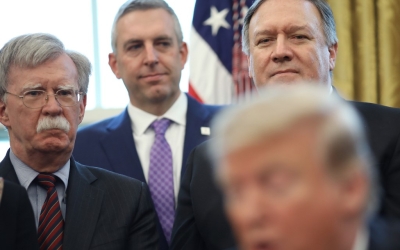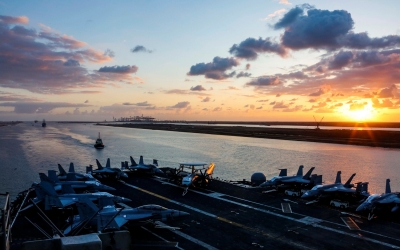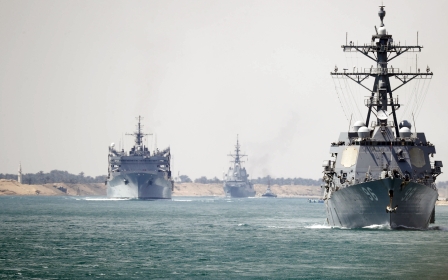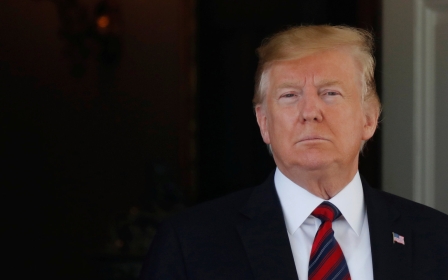America first vs America only: How John Bolton is fuelling Iran 'hysteria'
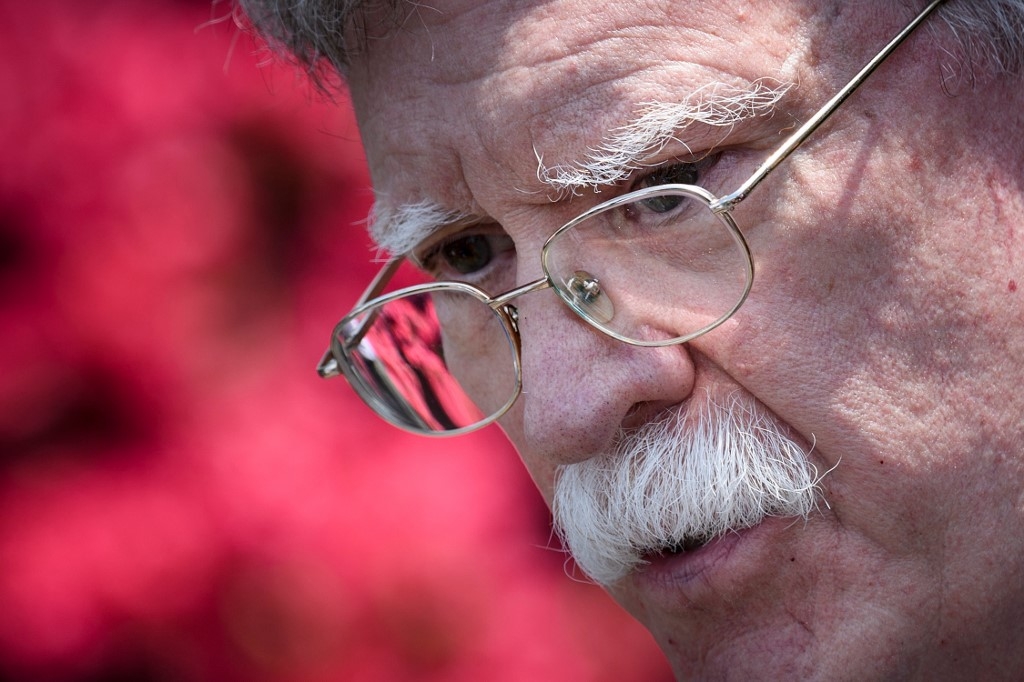
Despite the drums of war resonating ever louder this week, President Donald Trump has repeatedly said he isn't seeking a military conflict with Iran, instead urging the leaders in Tehran to engage in direct negotiations with Washington.
Still, Trump's seemingly conciliatory posture has not stopped a stream of threats from members of his administration.
Nor has it stemmed the flow of US media reports about the United States's alleged military plans, or purported Iranian schemes to attack American troops in the Middle East.
According to former US officials and analysts, the culprit behind the current crisis is most likely Trump's top aide: National Security Advisor John Bolton.
"He's been an advocate of regime change in Iran for decades, and that's one of his main goals," Peter Bergen, director of the national security studies programme at the New America Foundation, told Middle East Eye.
The latest round of escalation can be traced back to 5 May, when Bolton said Washington was sending a naval strike group to the Gulf with the aim of sending a "clear and unmistakable message to the Iranian regime".
Bolton, who has served in every Republican administration since Ronald Reagan's presidency, is known for his neo-conservative, hawkish foreign policy views.
He was a staunch supporter of the war in Iraq when he served in the State Department in the lead-up to the 2003 US-led invasion.
And as US ambassador to the United Nations between 2005 and 2006, he often defended then-president George W Bush's foreign interventions.
Wherever there is a government seen as hostile to Washington, Bolton has adopted a hard line against it.
For example, weeks before Trump's summit with North Korean leader Kim Jong-Un in June 2018, Bolton drew Pyongyang's ire by suggesting the "Libya model" for denuclearising North Korea.
Although the administration later clarified that Bolton was calling on Pyongyang to voluntarily give up its nuclear weapons as Tripoli did in the mid-2000s, the remarks were interpreted as a call for military strikes against North Korea.
Bolton "seemingly hasn't met a war he doesn't love," Bergen wrote in a CNN column this week.
'America only'
Still, Bolton's fondness for military interventions remains at odds with Trump's "America first" foreign policy and pledge to stop foreign wars and put an end to US-led "nation-building".
"The world view of regime-change is that if anyone has a different foreign policy than we do, it must be because they're wrong, and if they hold to it, they must be removed," former US diplomat Christopher Hill said.
"So, it is a statement not only of 'America first' but 'America only'."
The inconvenient truth is that only military action ... can accomplish what is required
- John Bolton wrote in 2015 in the NYT
Indeed, in a 1994 speech, Bolton said that the United States is "the only real power left in the world".
Hill, who served as the head of the US delegation for multilateral negotiations with North Korea in 2005 and as US ambassador to Iraq in 2010, said the recent impasse with Iran is largely coming "from the US side".
And Bolton in particular is "trying to whip up hysteria," Hill told MEE.
"I would support the British general who said there was nothing new in the threat level. However, I do not rule out that Iran may be responding to some of this."
Regime change in Iran
This month's tensions come a year after Trump pulled the US from the multinational Iran nuclear deal that saw Tehran significantly scale back its nuclear programme in exchange for the lifting of economic sanctions.
"The strategy seems to be to put additional sanctions on Iran to essentially tank the Iranian economy to produce some kind of popular uprising to replace the regime - or prepare some kind of military conflict," Bergen said of the administration's policy on Iran.
The Trump administration's stated policy is to exert "maximum pressure" on Iran to force Tehran to change its regional behaviour and end its nuclear programme.
But Bolton has said in the past that sanctions alone do not work.
"The inconvenient truth is that only military action ... can accomplish what is required," he wrote in a 2015 column published in the New York Times.
The article, titled "To stop Iran's bomb, bomb Iran," did not only call for targeting Iran's nuclear facility. It also advocated US-led efforts to topple the Iranian government.
"Such action should be combined with vigorous American support for Iran's opposition, aimed at regime change in Tehran," Bolton wrote.
It wasn't the first - nor would it be the last - time Bolton called for regime-change in Iran. In early 2017, days before Trump took office, Bolton backed the incoming president's pledge to scrap the Iran nuclear deal and presented a different approach.
I don't think you can ignore the fact that Bolton has made six-figure income from the [Iran opposition group] Mojahedin-e Khalq'
- Christopher Hill, former US diplomat
"The alternative policy is regime change in Iran," he said in an interview with Fox News at the time.
Speaking at a 2017 gathering for Mojahedin-e Khalq (MEK), an Iranian opposition group that was on the US list of terrorist groups as recently as 2012, Bolton went so far as to promise the Iranian government would fall by 2019 with Trump in office.
"I have said for over 10 years since coming to these events that the declared policy of the United States of America should be the overthrow of the mullahs' regime in Tehran," Bolton said.
"The behaviour and objectives of the regime are not going to change, and therefore the only solution is to change the regime itself. And that's why, before 2019, we here will celebrate in Tehran."
Bolton's motives
Some of Bolton's critics say his views on Iran may not be driven by only ideology.
The MEK paid him $40,000 for that 2017 speech, according to financial disclosures, and over the years, Bolton has reportedly received more than $180,000 from the Iranian opposition group.
"I don't think you can ignore the fact that Bolton has made six-figure income from the Mojahedin-e Khalq and has publicly called for them as the successor regime," Hill said.
"So I think it's a little hard to sort out one's personal interests with a national interest here."
Regardless of Bolton's motives, Trump ultimately remains in charge, and he appears to want dialogue - something that may not bode well for his senior adviser.
In fact, the New York Times reported on Thursday that Trump was "frustrated" by the perception that Bolton is leading the administration's Middle East policy.
What that says about his future in the White House remains unclear, as the president has regularly disposed of close aides who are considered influential in his administration.
Eight months into his tenure, Trump fired his chief strategist Steve Bannon, while cabinet secretaries, chiefs of staff and top White House officials once seen as indispensable have come and gone. Bolton himself is Trump's third national security adviser in less than three years.
Still, Trump's invitations for Iranian leaders to call him to avoid a military conflict may not be effective, said Hill, who is currently the chief global adviser at the University of Denver.
"When you aggravate an agreement, calling it 'the worst deal ever,' and then say, 'but I'll just call them back and they'll give me more concessions,' you might be able to pull that off in the New York real estate market," Hill said. "I'm just not sure the Iranian leadership wants to go along with this."
Middle East Eye propose une couverture et une analyse indépendantes et incomparables du Moyen-Orient, de l’Afrique du Nord et d’autres régions du monde. Pour en savoir plus sur la reprise de ce contenu et les frais qui s’appliquent, veuillez remplir ce formulaire [en anglais]. Pour en savoir plus sur MEE, cliquez ici [en anglais].


